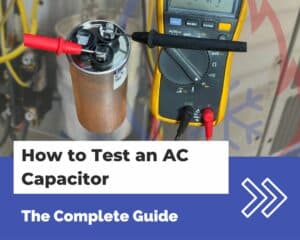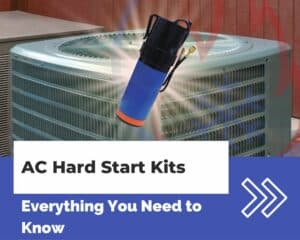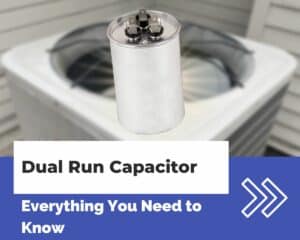Is your AC not working the way it’s supposed to?
It could be a bad AC capacitor.
But what is the capacitor anyway? And how do you know for sure that your AC’s capacitor is bad?
In this article, I’ll go over all the symptoms of a bad AC capacitor. I’ll also cover what else could be wrong with your AC—that way you don’t fix something that’s not broken.
The symptoms of a bad AC capacitor
The capacitor is used to give an initial “jolt” of energy to start the electric motors in your AC.
The blower fan, condenser fan, and compressor are the components in your AC that usually have a capacitor.
If you suspect that your AC’s capacitor is bad, it will exhibit one or more symptoms.
Here are the symptoms of a bad AC capacitor:
- Capacitor is swollen
- AC is not blowing cold
- AC unit is making a humming noise
- AC unit is tripping its circuit breaker
- AC condenser fan is not spinning
- AC blower is not working
- Bad smells are coming from the AC
- AC unit is shutting down randomly
I’ll go over them below.
Capacitor is swollen
If your AC capacitor is swollen and bulging at the top, then it is bad.
Swelling at the top of the capacitor is a telltale sign that a capacitor has gone bad.
If your see that the capacitor is warped and deformed at the top, you’ll need to replace it as soon as possible.
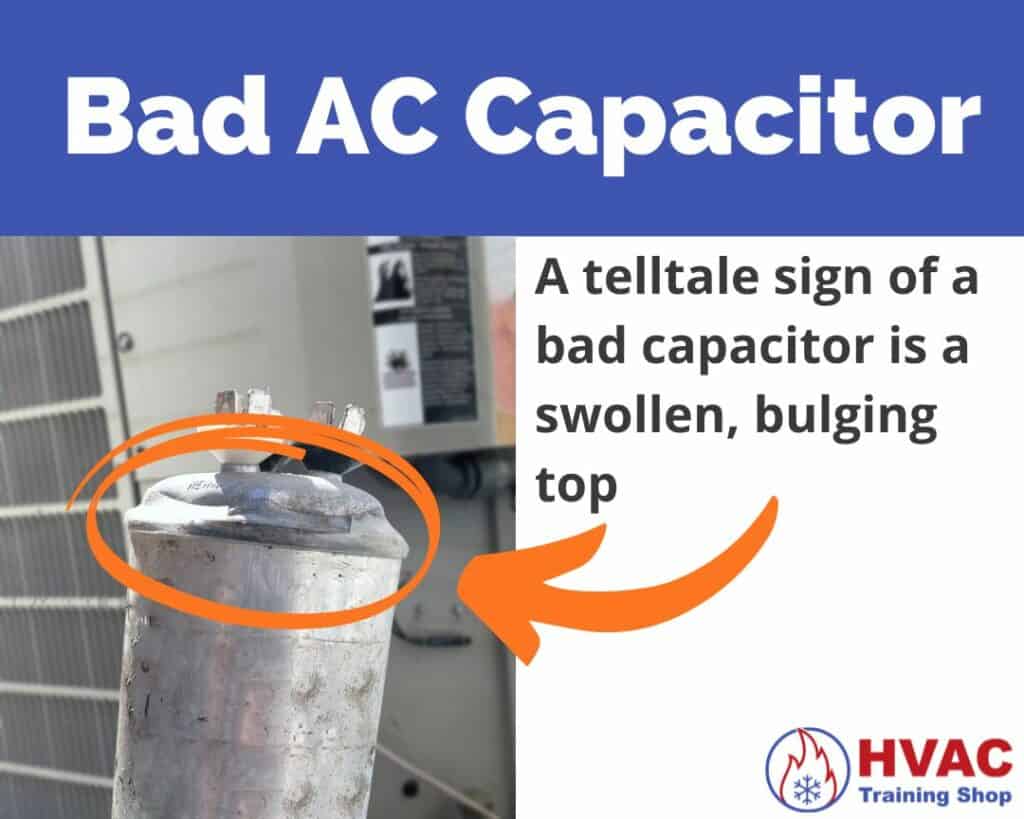
AC is not blowing cold
If your AC is not blowing cold, then it could have a bad capacitor.
A bad capacitor will prevent your AC unit from turning on. And if your AC unit outside doesn’t turn on, then your AC won’t blow cold.
However, there are all sorts of causes of an AC that doesn’t blow cold air—a bad capacitor is just one of them.
For example, a dirty condenser coil or a clogged condensate drain could also cause your AC to not blow cold.
For more information on what you should do if your AC isn’t blowing cold air, check out my article below:
AC unit is making a humming noise
An AC unit that makes a humming noise is a common symptom of a bad capacitor.
So why does an AC unit hum if it has a bad capacitor?
The compressor in an AC hums when it fails to start up. The humming noise comes from the compressor’s windings trying to get the compressor moving.
The dual run capacitor in your AC is responsible for giving the compressor the initial “jolt” of energy that it needs to turn on.
If your AC unit’s capacitor is bad, then the compressor makes a humming noise since it can’t turn on.
Changing your AC’s capacitor may get your compressor up and running again.
AC unit is tripping its circuit breaker
If your AC unit is tripping its circuit breaker, then it may have a bad capacitor.
In fact, a bad capacitor is one of the top reasons why an AC trips its circuit breaker.
A bad capacitor trips an AC breaker because the AC needs the extra energy from the capacitor to start up.
If your AC’s capacitor is bad, then the AC unit draws too much electricity and overamps, tripping the circuit breaker.
Changing your bad AC capacitor may stop your AC from tipping its circuit breaker.
If your AC keeps tripping its circuit breaker, check out my article below:
AC condenser fan is not spinning
If your AC’s condenser fan is not spinning, that could mean that your AC’s capacitor is bad.
The AC unit’s dual run capacitor is responsible for giving the condenser fan its initial “jolt” of energy to get started.
If the capacitor goes bad, then the condenser fan won’t spin.
You might also hear a humming noise come from the condenser fan—that’s another sign that the capacitor is bad.
But a bad capacitor isn’t the only thing that causes a condenser fan to not spin.
If your AC’s condenser fan isn’t spinning, check out my article below:
AC blower is not working
If your AC’s blower is not working, then it could have a bad capacitor.
The AC condensing unit outside isn’t the only thing that has a capacitor. The blower fan in the air handler usually has a capacitor too—especially if you have an older unit.
The capacitor for your blower is a completely different capacitor than the one in your AC unit outside. The blower capacitor is usually strapped to the side of the blower fan.
The blower capacitor is flat on two sides, not cylindrical like the dual run capacitor in the AC condensing unit.
If you suspect your blower capacitor is bad, you can test using a multimeter. Just unplug the capacitor from the fan, discharge it by shorting its terminals, then test it using your multimeter’s capacitance setting.
If your blower capacitor is bad, you’ll need to replace it with one that meets the same specs.
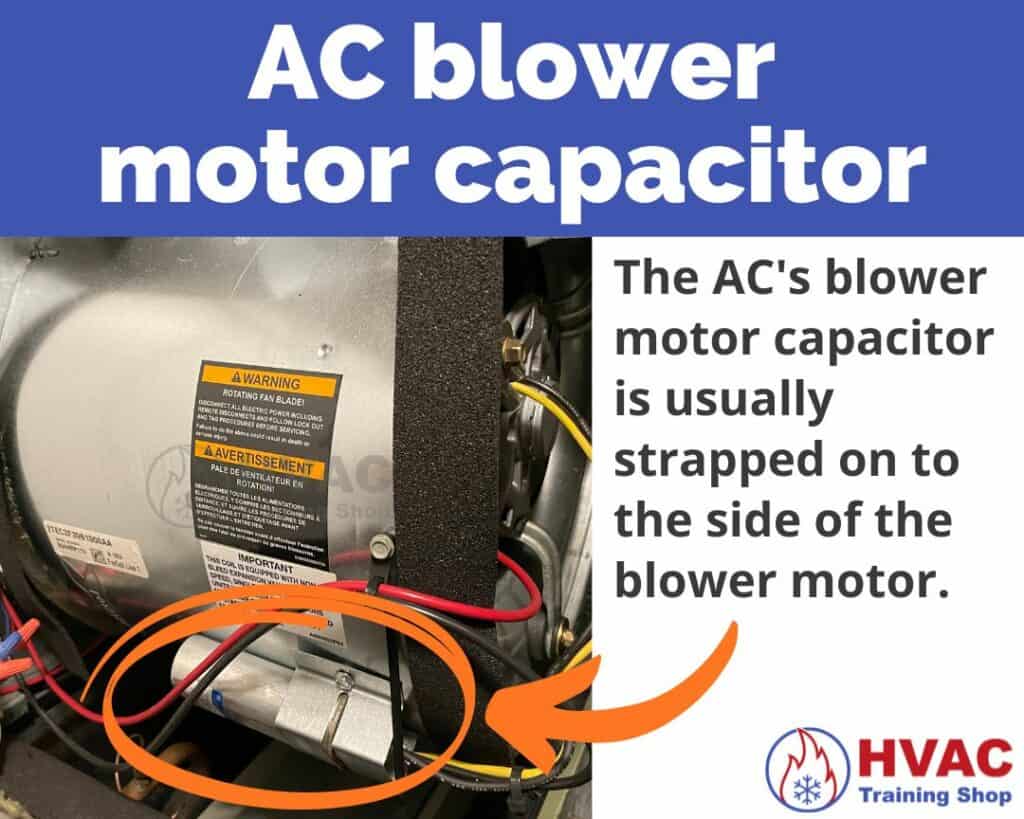
Bad smells are coming from the AC
If your AC is giving off bad smells, then a component is overheating. Turn off the power to your AC as soon as possible.
A bad capacitor could be the component that’s causing your AC to overheat.
However, if your AC is at the point where it’s overheating and putting out smells, then you shouldn’t try to fix it yourself. Call an HVAC professional to take a look at your AC unit instead.
AC unit is shutting down randomly
An AC unit that shuts down randomly could mean the AC capacitor is going bad.
When your AC shuts down randomly, the capacitor is having trouble keeping the AC unit running.
You’ll hear the AC turn on, but then shut off abruptly later—even when your thermostat is still calling for cooling.
Keep in mind that a bad capacitor isn’t the only thing that causes an AC to turn off randomly—it’s just one of the causes.
I recommend testing your capacitor to see if it’s bad. If your capacitor is bad, then swap it out with a new one.
If your AC unit still shuts down randomly, then it’s time to call an HVAC professional for help.

